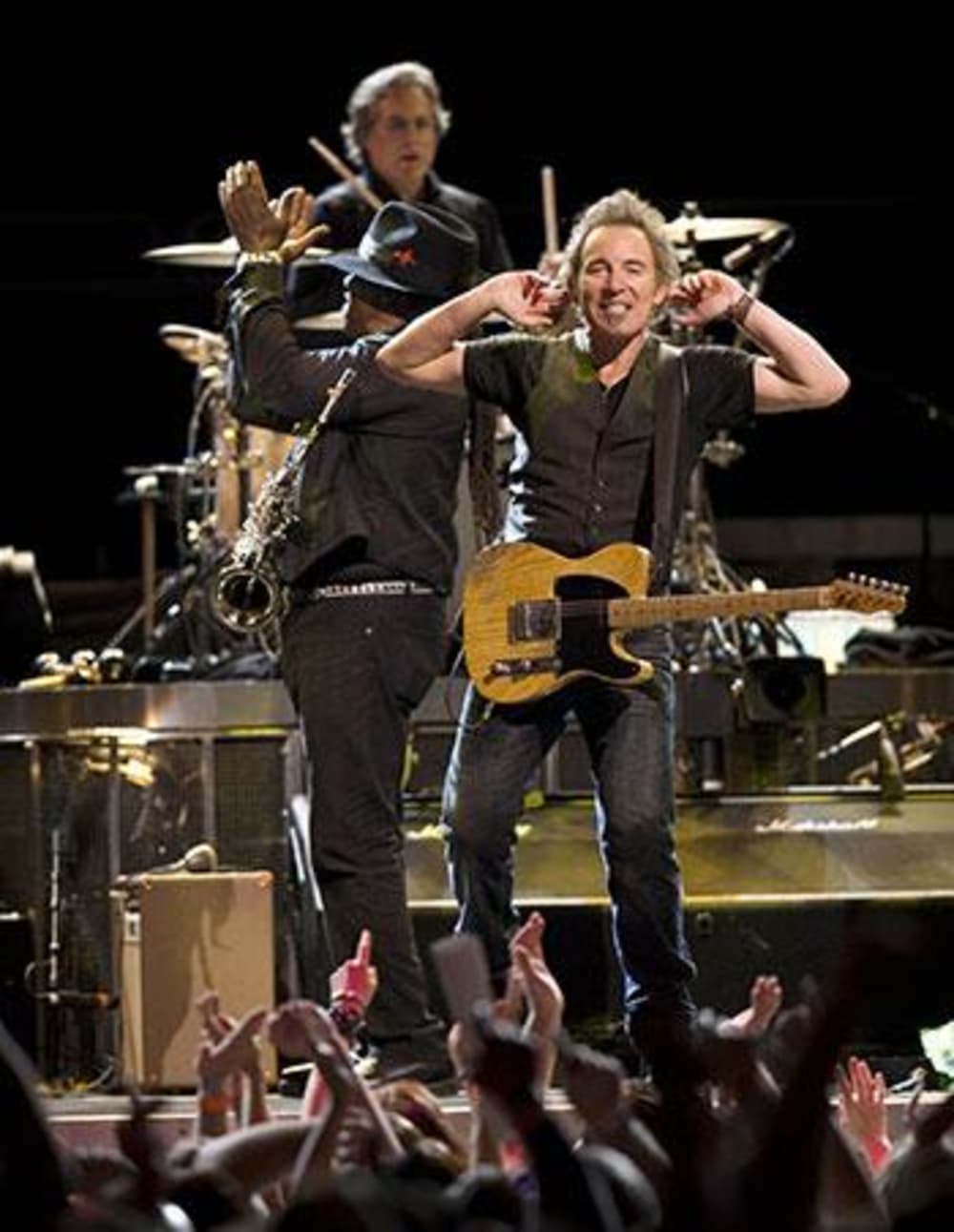No Retreat, No Surrender
Would Bruce Springsteen have ever been a rock star if he had a better dad? Songs80-71 in the ultimate countdown get personal
 Bruce Springsteen always knew how to command a stage.
Bruce Springsteen always knew how to command a stage. Springsteen often equates love to a rollercoaster.
Springsteen often equates love to a rollercoaster. Can you hear how close the countdown is getting to the Top 50?
Can you hear how close the countdown is getting to the Top 50?
Would you want Bruce Springsteen to eulogize you? And what do you think The Boss goes through on Father's Day?
These are just some of the questions that songs 80-71 on the Ultimate Springsteen countdown answer. And yes, we're into the Top 75.
Song 80: “Tunnel of Love”
Album: Tunnel of Love
Adobe Flash Required for flash player.
“It ought to be easy, ought to be simple enough/Man meets woman and they fall in love.” Ah, if only that were true, Boss man. Then again, if it were, we’d be robbed of so much great music, such as this stirring title cut to Bruce Springsteen's stellar 1987 meditation on the perils of romance.
This is one of the most dynamic singles Springsteen has ever delivered, and it certainly benefits from the presence of several band members, who had otherwise been hardly used on the album. The percussive start is almost funky, but then it opens up into the shimmering synthesizers of Roy Bittan. Things flow so smoothly that you can miss the fact that there isn’t much of a melody.
Bruce takes a metaphor that isn’t new but gives it a few twists and turns to make it feel new. What is essentially a song about love starts off in a tawdry way with the obese, leering carny quickly shattering any sentimental notions. As the ride begins, the shadows creep in, all the easier for two people to hide things from one another. The crazy mirrors also show the couple to each other as grotesque versions of themselves, preparing them for the bumpy ride ahead.
In the end, Bruce resigns himself to settling for hollow victories: “You’ve got to learn to live with what you can’t rise above.”
But Nils Lofgren’s guitar solo has the decisive say, an anguished howl that practically explodes out of the claustrophobic funhouse. The couple comes out the other side to hear the screams of the rollercoaster, and we’re left wondering if they’re now more queasy than invigorated by the ride they’ve had and the future that lies ahead of them.
Song 79: “Across the Border”
Album: The Ghost of Tom Joad
Adobe Flash Required for flash player.
Anyone fond of the phrase “hoping against hope” will recognize the sentiments of the narrator in this lovely offering from The Ghost of Tom Joad. An immigrant trying to make it into America, most likely illegally although we’re never told for sure, reassures his wife that their journey will end happily.
The series of promises is undercut by the reality of the situation, something that’s relayed to us by the world-weary cadences of the man playing the role of this immigrant, one Bruce Springsteen.
The melody is achingly pretty, and the subtle accompaniment of acoustic guitar is embellished with just the right bits of keyboards and percussion. Solos are taken by Soozie Tyrell on violin and Bruce on harmonica. Tyrell’s bit drips with melancholy, while Bruce plays with more force as if he’s trying to blow this pair to safety and happiness.
The couple’s Eden is a place of simple pleasures: Tranquil skies, a small house on a hill, a place where “pain and memory have been stilled.” But the lines that say it all about this man’s outlook come toward the end: “For what are we/Without hope in our hearts/That someday we’ll drink from God’s blessed waters.”
It’s as if he’s saying that it would be sinful to lose faith, and even mentioning the obstacles he faces would give them a credence they don’t deserve. It’s a touching ending, and it’s a credit to Bruce’s characterization of this narrator that we’re left hoping, against hope as it may be, that he finds his paradise, one way or the other.
Song 78: “Growin' Up”
Album: Greetings From Asbury Park, N.J.
Adobe Flash Required for flash player.
The mix is kind of lousy. The only thing that really stands out is the tinkling piano of David Sancious; everything else just kind of melds into a vaguely chugging rhythm. And the melody see-saws up and down but never really coheres into a tune.
But none of that matters once Bruce spits out his staggeringly brilliant first lines: “I stood stone-like at midnight suspended in my masquerade/I combed my hair till it was just right and commanded the night brigade.” They say that all songs should have a killer opening to grab the attention; Bruce does his job almost too well, because you can get lost analyzing those first two lines.
If you do, you’ll miss a ton of poetic gems sprinkled liberally through the quick-talking tale, like “I hid in the clouded wrath of the cloud.” Or how about this gem of a couplet: “I took month-long vacations in the stratosphere where you know it’s really hard to hold your breath/I swear I lost everything I ever loved or feared, I was the cosmic kid in full costume dress.”
Notice how the clever wordplay never comes at the expense of the emotional content and the themes Bruce is trying to get across.
His main theme is how loneliness is sometimes a necessary copilot on the flight out of adolescence. For all of the bravado on display here, Springsteen makes it clear that it’s a great risk to buck the popular wisdom of the crowd, and doing so isolates you.
But, in his case, it got him to the point where he could recount his tale for millions. “Growin’ Up” says what a lot of us would like to say about our own formative experiences, but none of us have the skill to say it as well as Bruce.
Song 77: “I'm On Fire”
Album: Born In The U.S.A.
Adobe Flash Required for flash player.
Born In The U.S.A. was on such a roll that when this song was released it shot into the Top 10 despite some pretty intense themes that weren’t exactly the usual teeny-bopper fare. Or maybe listeners were distracted by the Johnny Cash boom-chicka beat that Bruce conjured with Max Weinberg. The mournful synthesizer whine played by Roy Bittan was far more to the point of what this track was about.
Springsteen plays the other man in a love triangle here, trying to persuade a woman to cuckold her husband and doing so without a trace of remorse. His desires completely overwhelm any such reservations, as he expresses, quite violently, in the final verse. At the end of the song, he’s left “woo-hooing” into the night, a release of all of this sexual frustration as the music chugs on.
MTV made a big deal at the time about it being the first video in which Bruce “acts,” although as an actor, Bruce made a pretty good rock star. It was just another distraction which allowed Springsteen’s subversively pitch-black ode to carnal longing palatable to the masses.
Song 76: “Tougher Than the Rest”
Album: Tunnel of Love
Adobe Flash Required for flash player.
Bruce comes on like a gunslinger on this Tunnel Of Love track, only the outlaws he’s picking off are the would-be suitors of the object of his affection. Aided by some pretty imposing traveling music, you get the feeling that Springsteen wins the heart of the girl at the end of this movie.
Max Weinberg’s drum beat smacks you in the teeth and right off the bat you can tell that this ride won’t be for the faint of heart. The low synthesizer notes that rumble as a kind of opening riff set the moodily imposing tone. The background is kept pretty spare from there on out, just the percussion and some distant organ from Danny Federici adding color. Bruce adds a wheezing harp solo at the end to add the exclamation point.
If we’re going to stick with this gunfighter metaphor, then it’s clear that Bruce is no Young Gun here. Consider him more of a grizzled, man-of-few-words, seen-his-share-of-battles type, like Clint Eastwood in Unforgiven or Tommy Lee Jones in Lonesome Dove. He’s been around enough to realize that love is sometimes a process of elimination: “Well ‘round here baby /I’ve learned you get what you can get.”
In the end, what he can offer is the fortitude and resolve to deal with all of the trials and tribulations of romance. I have a feeling that has sounded like a pretty damn good offer to millions of female Springsteen fans since the first time they heard this song.
Song 75: “Adam Raised a Cain”
Album: Darkness On the Edge of Town
Adobe Flash Required for flash player.
While punk rock was bubbling up like some sort of primordial beast on both sides of the pond, Bruce Springsteen fired right back in 1978 on this track from Darkness On The Edge Of Town with some of the fiercest music he’d ever recorded. He plays the guitar as if he’s trying to choke the life from his strings, and he sings with the primal howl once used by John Lennon for his landmark Plastic Ono Band album.
The demons Springsteen is trying to exorcise here are the familial kind. In a small town, the possibility of escape is directly related to your father’s lot in life, Springsteen argues. No matter the differences between father and son, their life’s path often runs to the same dead ends.
“You inherit the sins, you inherit the flames.” By tying this phenomenon to Biblical characters, the protagonist is trying to insinuate that nothing really changes, but the anguished screams he uses to articulate this point makes it clear that this knowledge provides little consolation.
The music dismisses the grandeur of the Born To Run days, but sacrifices none of the power. The band shouts maniacally in response to Springsteen’s refrain, as if they can all relate. The music here cannot transcend the situation as on past songs; it can only express the pain.
A missive written from “the dark heart of a dream,” “Adam Raised A Cain” is incendiary, thunderous, and still, for the characters trapped within, a heartbreaking exercise in futility.
Song 74: “Terry's Song”
Album: Magic
Adobe Flash Required for flash player.
If any one of you out there have attempted to eulogize someone, you know what a difficult task it is. As someone who’s done it twice now, I feel like my efforts were woefully inadequate in proportion to the impact of the loved ones I was attempting to salute. It’s hard to do it without resorting to clichés, and it’s even harder to sum up a lifetime’s worth of feelings with a few concise thoughts.
On June 23, 2007, Springsteen’s longtime personal assistant Terry Magovern passed away, and Bruce, ever loyal, wedged this touching tribute onto his already finished album, Magic. In doing so, he provided a primer for every eulogist to come, a poetic yet accessible set of lyrics that, since they keep clear of specific attributes, can be used to honor just about any individual considered whose loss is deeply felt.
Bruce’s main trick is contrasting the indestructibility of some of man’s most lasting monuments to the fragility of one human soul, and then insisting that those monuments don’t stand a chance in terms of their impact on the world. As the soul leaves for that “dark ether,” those it leaves behind are irrevocably altered for the better by the time they were graced by its presence.
“Terry’s Song” manages to uplift even while it’s breaking your heart, and Terry Magovern must be getting a kick out of the fact that he’s being indirectly honored every time some eulogist, at a loss for words, uses this song as a cheat sheet.
Song 73: “The Wish”
Album: Tracks
Adobe Flash Required for flash player.
Bruce Springsteen wrote so many songs about his troubled relationship with his father that you could probably put together a Greatest Hits album just with those songs alone. But he didn’t write much about his Mom, Adele, mainly because, by all accounts that I’ve read, they got along just fine.
Songs about loving your mother don’t really make great rock and roll, I suppose, but Bruce took the time during the Tunnel Of Love sessions to toss off this loving ode to Adele that combines detailed memories, a genial sense of humor, and true emotion to comprise a truly moving portrait of their relationship.
The music is a bit generic, just some simple acoustic guitars and synths with a vaguely Motown feel to the proceedings. There isn’t really a chorus to speak of, just verses, and you get the feeling that Bruce never intended it as an album contender. It’s simply a gift, and don’t we all wish we could salute Mom as tenderly.
After retelling some childhood memories, including how he received his first guitar for Christmas, Bruce yields a glimpse into what Adele did for him: “If Pa’s eyes were windows into a world so deadly and true/You couldn’t stop me from looking but you kept me from crawlin’ through.”
In other words, she saved Bruce from living the life of his father, giving him the freedom he needed to allow his God-given talent to shine through.
In repayment, he offers to take his mom out for a dance and to sing her favorite song, as long as it’s of an upbeat nature. After hearing “The Wish,” you’ll wonder why every groom doesn’t choose it for the dance with his mom at the wedding reception, thereby banishing “Wind Beneath My Wings” to the special hell it deserves.
Specifics of the situation aside, it gets right to the heart of the universal bond between mother and son. As a mama’s boy myself, well, let’s just say that it’ll be on the playlist at my wedding as well.
Song 72: "From Small Things (Big Things One Day Come)"
Album: The Essential Bruce Springsteen
Adobe Flash Required for flash player.
Take two parts Chuck Berry and one part Pulp Fiction and you’ve got this beloved outtake recorded in 1979. What could have been a too-silly tale is grounded by Springsteen’s winning details, from the girl working in an all-night hamburger stand to the local place names.
The track is a rip-snorter, all snapping drums and bouncing '60s organ. The retro-boogie style made it a good fit when roots-rocker Dave Edmunds did a cover version in 1982. Bruce’s own version would remain unreleased until it found its way to the bonus disc of "The Essential Bruce Springsteen," which contains several long-lost classics.
The irony of the title is inescapable; the big things that come from this girl are the abandonment of her kids, the cuckolding of her husband, and the murder of her new lover. Springsteen also slyly acknowledges his obsession with the automobile, as the murderess kills her lover because of his poor driving skills. There isn’t really a moral to be taken away from this one, but you can easily picture the movie poster.
Song 71: “Outlaw Pete”
Album: Working On a Dream
Adobe Flash Required for flash player.
I’ve gone back and forth many times with this beast of a song, the opening track off Working On a Dream. I still have some problems with it, but the bottom line is that I never get tired of hearing it; it brings a rush every time.
Is Bruce biting off more than he can chew when he claims the song was inspired by the Bush administration and his belief that they refused to heed the mistakes of the past or expect consequences for the actions they committed? I think so. The song works better the less depth you try to lay on it. Best just to enjoy the Bunyanesque tale for what it is: A larger-than-life Western, almost supernatural in places, that casts a wary eye on the evil that men do.
Springsteen’s fascination with Westerns is well-documented; the music he chooses to accompany his saga is a perfect fit. It’s a little like a Ennio Morricone score mixed in with one of Jeff Lynne’s more elaborate ELO productions. The four-note main motif is movingly elegiac, even if some of the guitar fillwork unwittingly recall the melody of Kiss’ “I Was Made For Loving You.” (Trust me, you’ll hear it.)
The tale makes it clear that redemption is impossible; Pete’s ruthless past catches up with him eventually in the form of the sneering bounty hunter who tracks him down. Even before then, this bad man can sense the ghosts surrounding him in his sleep, hence his futile flight from home and hearth.
It all leads up to the final startling image, as Pete sits high on a snowy mountaintop and prepares to take a header with his steed over the ledge as his only means of true escape. It’s as if John Ford started to direct the picture and then David Lynch took over. It’s a bit of an uneasy mix, but it’s still endlessly fascinating.




